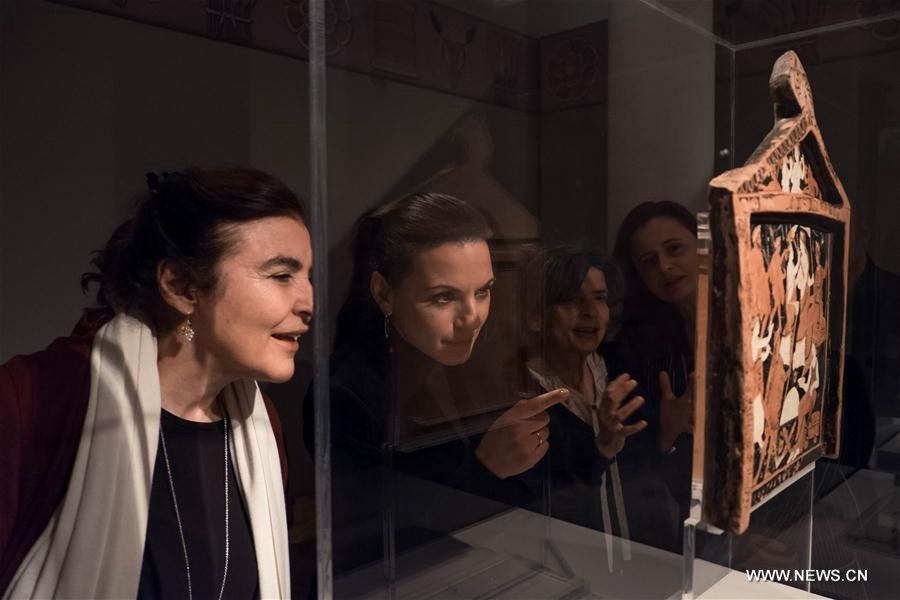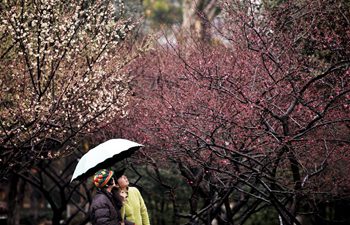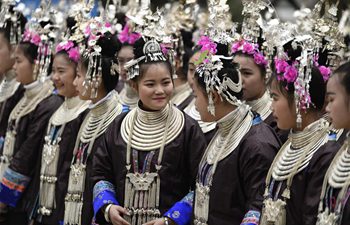
Greek Minister of Culture Lydia Koniordou (1st L) visits the temporary exhibition "Eleusis, The great mysteries" at the Acropolis Museum in Athens, Greece, on Feb. 25, 2018. A new temporary exhibition dedicated to the Elefsinian Mysteries opened at the Acropolis Museum in the Greek capital on Monday, taking visitors to a journey back to one of the most important religious sites of ancient Greece which remained a secret through the centuries. (Xinhua/Lefteris Partsalis)
ATHENS, Feb. 27 (Xinhua) -- A new temporary exhibition dedicated to the Elefsinian Mysteries opened at the Acropolis Museum in the Greek capital on Monday, taking visitors to a journey back to one of the most important religious sites of ancient Greece which remained a secret through the centuries.
Until mid-May this year, people can admire some 60 ancient works of art from the Athens Antiquities Ephorate, the West Attica Antiquities Ephorate and the National Archaeological Museum which were brought together for first time under the title "Eleusis, the Great Mysteries".
Eleusis is the ancient Greek word for Elefsina, a town which is still situated about 18 km northwest from Athens.
The Elefsinian mysteries, a major festival as early as the 6th century BC to Roman times, represented the myth of the abduction of Persephone from her mother Demeter, the goddess of agriculture and fertility in ancient Greek mythology, by the king of death and the underworld, Hades.
The rites, ceremonies and beliefs of those initiated in the Elefsinian mysteries were kept secret. Participants in the mysteries had to swear a vow of secrecy.
The exhibition at the Acropolis museum has been set up so as to resemble the Telesterion, while the corridor leading to the temporary exhibition's gallery features a video presentation and aerial photographs of the Sacred Way that was used by the procession of worshippers, the museum's director Prof. Dimitris Pantermalis said.
"This symbolism of the goddess which brings sorrow and joy reflects the joy and sorrow of people who live and die, but life goes on for eternity," he added.
"The exhibition at the Acropolis museum is very important, because it is the first time that very significant findings from Elefsina's sanctuary are put on display at the museum," archaeologist Kalliope Papaggeli, head of the archaeological site and the museum of Elefsina, and co-curator of the exhibition told Xinhua.
Among the most important artifacts put on display are the statue of the "Fleeing Persephone" (around 480 BC) and ceremonial vessels depicting the leading figures of the great mysteries, Hierophant and Dadouchos, a priest leading initiates holding a torch, Papaggeli said.
Many of the items come from the museum of Elefsina, others are loans from the National Archaeological museum, while some have been stored for years at the Antiquities Ephorates.
Papaggeli expressed hope that after seeing the items at the Acropolis museum visitors may be intrigued to visit the places the exhibits originated from.
In Elefsina's case, they will discover a modern town which was declared European Capital of Culture for 2021.
"Worshippers received strict instructions to not say a word about the mysteries. This is why there was no room to reveal much information about the ancient mysteries," Greek Culture Minister Lydia Koniordou said while addressing the event.















